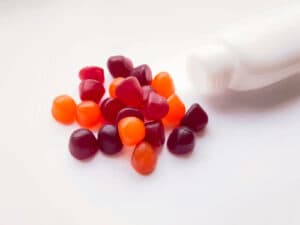Medical Disclaimer: The following content should not be used as medical advice or as a recommendation for any specific supplement or medication. It is important to consult your health care provider prior to starting a new medication or altering your current dosage.
Melatonin supplements frequently include an expiration date, which is the manufacturer’s guarantee that the product is potent and safe if used prior to the date on the bottle or label. However, not all melatonin products include an expiration date. More research is still needed to learn if a melatonin product past its expiration date is safe.
Melatonin is a hormone made in the brain that helps the body tell when it’s time to go to sleep and when it’s time to wake up. People use synthetic melatonin in supplements to help with a range of sleep problems, including insomnia, jet lag, and some sleep problems in children.
Between 1999 and 2018 there was a five-fold increase in the number of people using melatonin. As more people consider taking this supplement to help with sleep, knowing whether melatonin expires can help them make informed decisions about their sleep health.
Melatonin Expiration Dates
Unlike with prescription drugs, the U.S. Food and Drug Administration (FDA) does not review data about whether a supplement is safe or effective or oversee labeling for supplements.
In 1979, the U.S. passed a law stating that drug manufacturers must place an expiration date on all their products. The date stamped on the product is the manufacturer’s guarantee that the drug is fully potent and safe to use until the expiration date.
Since the FDA classifies melatonin as a dietary supplement, not a drug, manufacturers are not required to stamp an expiration date on the bottle. Even so, many supplement manufacturers choose to include expiration dates on their labels or bottles.
People concerned about using quality supplements may consider melatonin products that are approved by the United States Pharmacopeia (USP), an independent nonprofit organization. The USP sets health care product standards in the U.S. Products approved by the USP have met the organization’s high standards for quality, purity, strength, labeling, and packaging.
How to Find the Expiration Date
Melatonin may have an expiration date or a “use by” or “best by” date printed on the bottle or label. In addition, there may also be a “date of manufacture,” which provides the consumer with information about when the product was produced.
Is Expired Melatonin Safe to Take?
Although some drugs have been studied and found to be safe to take after their expiration dates, more research is needed to determine whether this is true for melatonin. If you have expired melatonin, make sure to talk with your doctor or a pharmacist before taking it.
One potential concern about taking medications or supplements past their expiration dates is that their chemical make-up may change over time. This means they might not work as well because of reduced strength, or they might break down into other substances that produce different effects.
How Long Does Melatonin Last in the Body?
Melatonin levels in the body peak roughly 60 minutes after a person takes a dose of 1 to 5 milligrams, which is the range for many oral melatonin formulations. Within eight hours, melatonin levels typically return to normal.
The term “half-life” refers to the time it takes the body to eliminate half of the original concentration of a drug. The half-life of melatonin supplements is approximately 20 to 50 minutes.
How to Properly Store Melatonin
Like all supplements and medications, melatonin should be stored in a dark place that is cool and dry. Proper storage of melatonin and other supplements helps ensure they maintain their potency.
Avoid storing melatonin in a medicine cabinet or vehicle, both of which can be hot and humid. Instead, consider storing melatonin in its original container in a location such as a kitchen cabinet, closet, or dresser drawer.
Always ensure the lid on the melatonin bottle is tightly closed, and store the supplement in an area where children can’t see or reach it. Supplements, including melatonin, can be harmful to the people who are not supposed to take them or who might take them in the wrong way.
In 2020, U.S. poison control centers received more calls about children ingesting melatonin than about the ingestion of any other substance. Keeping medications and supplements away from children prevents accidental or intentional overdose.
If you have questions about the best way to store melatonin or any other dietary supplement, speak to a pharmacist. Pharmacists can provide information on the best way to store a variety of medications, including melatonin.
How to Dispose of Expired Melatonin Products
There are several ways to safely dispose of expired melatonin products, including drug take-back programs and at-home disposal.
Drug take-back programs allow for the safe disposal of supplements, including melatonin, outside of the home. Local law enforcement, pharmacies, and certain community groups sponsor these programs throughout the year. A pharmacist can provide information about drug take-back programs in your community.
If a drug take-back program is not available in your area, you can still safely dispose of melatonin at home. Some supplements and medications can be safely flushed down the toilet or drain. The product’s packaging often provides direction on whether it is safe to dispose of it down the drain.
Expired melatonin can also be safely discarded by mixing it with used coffee grounds or kitty litter. Place the mixture inside a plastic bag or a plastic container with a lid. Next, place the lid on the container or tie the plastic bag closed. Finally, place the bag or container in the trash.
Disposing of expired melatonin products in a responsible manner prevents people of all ages, as well as pets, from finding the supplements and misusing them.
Talk with a pharmacist or health care provider if you have questions about how to dispose of expired melatonin.
References
Ask the Sleep Doctor
Have questions about sleep? Submit them here! We use your questions to help us decide topics for articles, videos, and newsletters. We try to answer as many questions as possible. You can also send us an email. Please note, we cannot provide specific medical advice, and always recommend you contact your doctor for any medical matters.











































